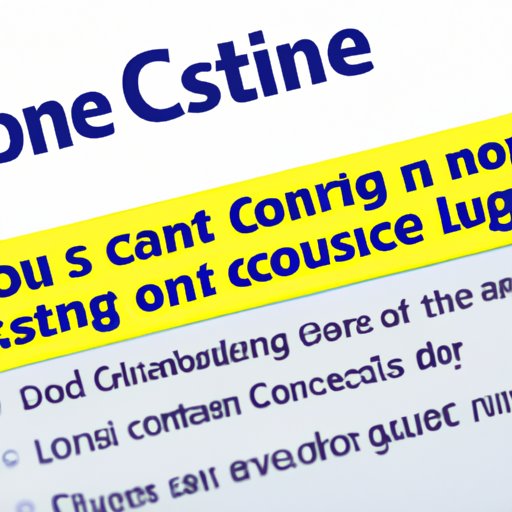Introduction
When buying a home, there are many expenses to consider beyond the purchase price. One of these is closing costs, which are fees associated with purchasing a property. Understanding what closing costs are and how to finance them can help you make the most informed decision when it comes to buying a home.
Definition of Closing Costs
Closing costs are fees paid at the end of the home buying process as part of the final settlement. These costs can vary depending on the state in which you are purchasing the home, but typically include things like title insurance, appraisal fees, attorney’s fees, transfer taxes, recording fees, and other charges. They can range from 1-4% of the total purchase price of the home.
Overview of Financing Closing Costs
Financing closing costs is an option for buyers who don’t have enough cash on hand to cover them. It involves taking out a loan to cover the cost of the closing fees. This is typically done by rolling the closing costs into the overall loan or adding them to the principal balance. The loan then accrues interest over time.

Exploring the Pros and Cons of Financing Closing Costs
Pros
The biggest advantage of financing your closing costs is that it allows you to purchase a home without having to come up with the cash all at once. This can be especially helpful for first-time homebuyers who may not have enough funds on hand to cover the costs. It also makes it easier to budget for the purchase of a home since you don’t have to worry about coming up with the cash for the closing costs all at once.
Cons
The downside of financing your closing costs is that it adds to the overall loan amount. This means that you’ll have to pay more in interest over the life of the loan. Additionally, it can be difficult to calculate exactly how much you’ll be paying in the long run since the interest rate and closing costs can vary from lender to lender.
How to Determine if Financing Your Closing Costs is Right for You
Assessing Your Financial Situation
Before making any decisions about financing your closing costs, it’s important to assess your financial situation. Consider how much money you have saved, how much of a down payment you’re able to make, and what kind of monthly payments you’re comfortable with. Knowing this information can help you decide whether financing your closing costs is the right choice for you.
Understanding the Interest Rate on the Loan
It’s also important to understand the interest rate on the loan. You should compare rates from different lenders to make sure you’re getting the best deal. Additionally, you should consider the length of the loan and whether or not you’ll be able to afford the payments over the long term.
Considering Other Options
Finally, it’s important to consider other options for covering your closing costs. For example, you could ask the seller to pay some or all of the closing costs, or you could try to negotiate a lower purchase price to offset the costs. It’s also possible to get grants or other forms of financial assistance to help cover the costs.

Tips for Negotiating Closing Costs with Your Lender
Researching Market Rates
One of the best ways to negotiate your closing costs with your lender is to do your research. Look at market rates in your area to get an idea of what similar homes are selling for and what closing costs lenders are charging. Knowing this information can help you negotiate a better deal.
Asking for a Discount
Another tip is to ask your lender for a discount on your closing costs. Many lenders are willing to negotiate, so don’t be afraid to ask for a lower rate or fee. Even if they won’t budge on the price, they may be willing to offer other incentives such as a lower interest rate or a longer repayment period.
Requesting a No-Closing Cost Mortgage
Finally, it’s worth asking your lender if they offer a no-closing cost mortgage. These types of mortgages allow you to avoid paying closing costs by rolling them into the loan. However, keep in mind that these loans usually come with higher interest rates and shorter repayment periods.

What to Consider When Looking for a Mortgage that Covers Closing Costs
Types of Mortgages
When looking for a mortgage that covers your closing costs, it’s important to consider the type of loan you want. Fixed-rate mortgages are a good choice if you plan to stay in your home for a while, while adjustable-rate mortgages are better if you plan to move soon. There are also government-backed loans such as FHA and VA loans, which can be beneficial for those with low credit scores.
Comparison Shopping
Additionally, it’s important to comparison shop for mortgages. Look at offers from different lenders and compare their interest rates, fees, and repayment terms. Don’t forget to read the fine print and ask questions if you don’t understand something. Taking the time to compare different offers can help you find the best deal.
Calculating the Cost of Financing Closing Costs
The Principal Balance
When calculating the cost of financing your closing costs, you’ll need to consider the principal balance. This is the amount of money you’ll owe on the loan after the closing costs have been added. This number will be used to calculate the total cost of the loan.
Interest Rate
You’ll also need to factor in the interest rate on the loan. This is the percentage of the loan amount that you’ll be charged in interest each month. The higher the interest rate, the more you’ll end up paying in the long run.
Closing Costs
Finally, you’ll need to consider the closing costs themselves. These include fees like title insurance, appraisal fees, attorney’s fees, and other charges. Make sure to take these costs into account when calculating the total cost of the loan.
Conclusion
Financing your closing costs can be a great way to purchase a home without having to come up with a large lump sum of cash. However, it’s important to understand the pros and cons of this option, as well as how to determine if it’s right for you. Additionally, you should be aware of tips for negotiating with your lender and what to consider when looking for a mortgage that covers closing costs. Finally, it’s important to calculate the cost of financing your closing costs to make sure you’re getting the best deal.
Summary of Pros and Cons
The pros of financing your closing costs include not having to come up with a large lump sum of cash all at once, as well as being able to budget for the purchase of a home. The cons include having to pay more in interest over the life of the loan, as well as having difficulty calculating the total cost of the loan.
Final Thoughts
Financing your closing costs can be a great way to purchase a home, but it’s important to understand all the factors involved. Be sure to do your research and compare different offers to ensure you’re getting the best deal. With the right knowledge, you can make an informed decision that works for you.
(Note: Is this article not meeting your expectations? Do you have knowledge or insights to share? Unlock new opportunities and expand your reach by joining our authors team. Click Registration to join us and share your expertise with our readers.)
